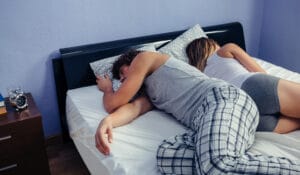Vacations – Long sunny Ddys – Beach time – Shorts & sandals – lemonade – Ice cream – It’s easy to list everything we like about summertime but sleeping hot and sweaty is one thing we could do without. Here are a couple of ideas to help keep you cool so you can get better sleep on hot summer nights.
As beautiful as the summer lifestyle is, the warmest time of the year does not offer the best conditions in terms of sleep biology.
When your body is exposed to temperatures above 85 ° Fahrenheit (above 30 ° Celsius) during the day that only cool slightly at night, you are exposed to heat stress. This is especially difficult and even dangerous for the elderly and those battling illness. Any kind of stress including heat stress disturbs your sleep.
Tossing and turning to find the cool spot on the sheets or kicking a leg outside the covers to cool off is already indicative of disrupted sleep. Too much movement prevents you from getting the restorative deep sleep that is the difference between waking up feeling well-rested and energized or not.
Here’s how can you get good sleep when it’s so hot.
Control the bedroom temperature
The first step to prevent sleeping hot and sweaty is to regulate the temperature in your bedroom. In order to initiate the physiological processes that lead to sleep, the body must first lower its temperature. When the room temperature is over 80° or more, falling asleep becomes difficult or you wake up repeatedly.
Block out as much of the summer sun as you can.
Keep the bedroom darkened during the day with shutters, blinds, or curtains to prevent it from trapping heat that you’ll feel at night. You should only ventilate the room early in the morning or at night after sunset when wide-open windows allow cooler air into the room instead of unwanted heat.
Use air conditioners and fans
Air conditioners and fans can be helpful but for some people, they can cause problems, too. For example, sensitive sleepers find the sound to disturb their ability to fall asleep and stay asleep. Although intended to cool the room, they can actually make you feel too cold and at times may even cause colds plus it’s a good idea to keep the bedroom free from electronics.
Yet hot nights and sleeping hot and sweaty call for some extra cooling effort. Because my partner is sensitive to sound, we use the air conditioner to cool the bedroom before going to bed and then turn it off when we shut our eyes. We then fall asleep with ease but I admit that we can wake up earlier as the morning sun begins to heat the world including our bedroom. This is one way to use nature as an alarm clock!
A hot or cold shower before bed – which is better?
After a hot sweaty day, you want to take a refreshing cold shower before bed, right? Well, that may be what you want to do but not what you should do. Why?
First, cool water stimulates your circulation and tends to perk you up which, of course, gets in the way of falling asleep.
Second, the blood vessels contract after a cold shower, which makes it harder for the body to release heat and, in turn, can lead to unwanted sweating later in bed. Perhaps this has already happened to you.
Opt for a warm shower or maybe a nice bath with the addition of soothing essential oils like lavender or bergamot.
According to a University of Texas study, a water temperature between 104 ° to 108.5 ° F (which is between 40 ° and 42.5 ° C) can help optimize the body’s natural cooling process which, in turn, improves the duration and quality of sleep. The right timing is also important: If you really want to sleep as cool as possible in the summer, you should take a warm shower or bath one to two hours before going to bed because that is how long it takes for the hoped-for cooling effect to take place.
A great option for the best summer sleep if you have the luxury to do so is to take a sauna or have a steam an hour or two before bedtime.
Drink enough water during the day
Temperature is just one factor that affects our sleep. Especially during hot summer days, we may not be drinking enough water to compensate for sweating more. It may be surprising to learn that when you are dehydrated, the urge to pee at night increases. Perhaps you’ve never thought that daytime hydration is a good way to sleep cooler. So, grab a glass of water right now! It will help give you one less reason to wake up so you can sleep better.
Learn more in our blog from last summer “8 Ways to Stay Hydrated for Better Sleep”.
The right bedding makes a difference!
We are in the healthy sleep business and need to remind you that the right bedding for summertime can make a big difference in how well you sleep. Materials that absorb and neutralize excess sweating at night are key.
Think organic cotton and, although it may seem counter-intuitive, the cozy wool you use in the winter is also ideal for summer! Natural sheep’s wool helps you have a warm and dry bed. The benefits of sheep’s wool include:
- Naturally helps control humidity;
- Self-cleans with bio-active fibers that wick but don’t absorb moisture;
- Helps your muscles and body relax;
- Minimizes the conditions for mold to grow;
- Anti-bacterial materials (natural ones are safer and nontoxic);
- Breathable and light;
- Is supremely comfortable.
Sheep’s wool is the best natural air conditioning you can have in your bed for a cooling effect on a warm night.
Wee hope these tips help you sleep better during the hot summer nights and for even more creative ideas, check out this article: Sleep Cool When It’s Hot.






